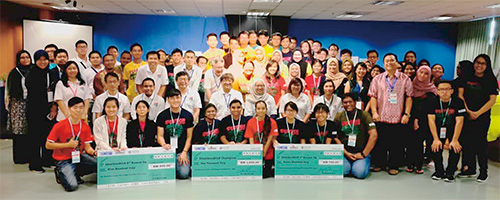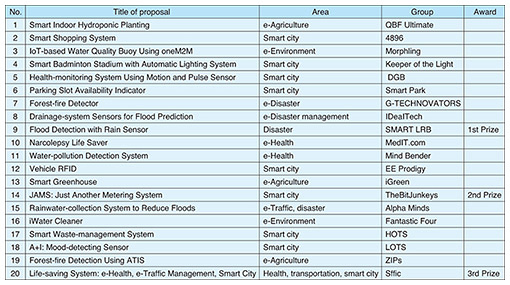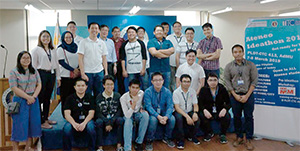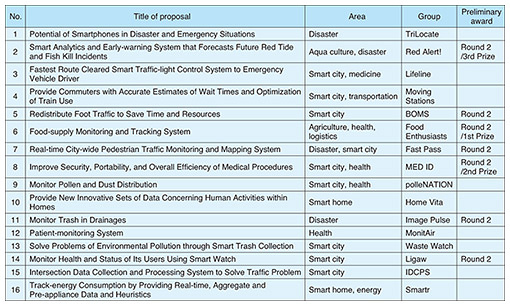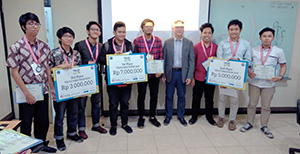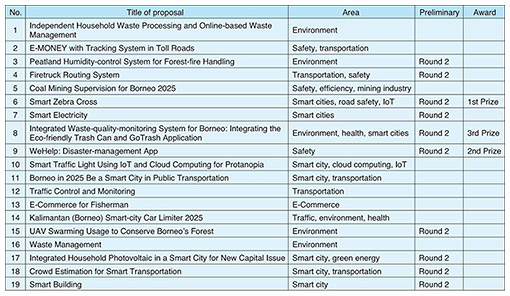 |
|||
|
|
|||
|
Global Standardization Activities Vol. 18, No. 4, pp. 61–65, Apr. 2020. https://doi.org/10.53829/ntr202004gls Activities of the APT/TTC Bridging the Standardization Gap Working Group—Holding of Ideathons in Cooperation with Universities in Southeast AsiaAbstractThe Bridging the Standardization Gap (BSG) Working Group of the Telecommunication Technology Committee (TTC) of Japan has been implementing and promoting the spread of information-and-communication-technology-based solutions to address social issues in rural areas of Asian countries with support provided by the Asia-Pacific Telecommunity (APT). It has launched a platform designed to share data obtained at pilot sites in a number of countries, related to several fields including agriculture, fisheries, the environment, medical care, education, and disaster prevention. It held events at which ideas were proposed on how to create new industries through the utilization of data across different industries. This article presents an overview of these events. Keywords: TTC, BSG, APT, ideathon 1. First ideathonThe first ideathon was held at the University of Malaysia Sarawak in Kuching, Malaysia, on December 5 and 6, 2018. 1.1 oneM2M Workshop (pre-ideathon workshop)On November 28, before the ideathon was held, a lecturer from the University College of Technology Sarawak in Malaysia, held a workshop for 70 students at the University of Malaysia Sarawak. He gave an overview of oneM2M*, demonstrated how to set up a oneM2M-compliant server and connect Internet of Things (IoT) devices to this server. 1.2 Ideathon@MalaysiaThis ideathon was held over two days and was attended by 76 students in 20 teams from the University of Malaysia Sarawak, and University College of Technology Sarawak (Photo 1). The teams were then further divided into three groups and gave presentations and demonstrations in each group. The top team in each group gave additional presentations in the plenary session, then the teams were ranked.
The titles of proposals and the areas targeted by the participating teams are shown in Table 1.
Since Kuching is a provincial city in Borneo, there were few proposals addressing the problem of traffic congestion. The most common topics were disaster-response solutions to floods and forest fires and medical issues, including problems with water quality.
2. Second ideathonThe second ideathon took place at Ateneo de Manila University, Manila, the Philippines, on March 6–8, 2019. 2.1 Technical Specifications WorkshopOn March 5, the day before the ideathon was held, Dr. Daniel of Ateneo de Manila University explained and demonstrated to 26 students how to connect oneM2M-compliant IoT devices to a oneM2M-compliant server. 2.2 Ideathon@PhilippinesBefore the final ideathon (Round 2), an elimination round (Round 1) was held at Ateneo de Manila University with 34 students in 16 teams from the university, and 7 teams were selected (Photo 2). The final ideathon (Round 2) was held with judges from Japan, Malaysia, and the Philippines.
The titles of proposals, target areas of the participating teams, and awards presented at Ideathon@Philippines are shown in Table 2.
Since this region is prone to natural disasters, many proposals addressed disaster-related issues and issues related to a shortage of medical facilities and institutions. Also, many of the proposed solutions required the involvement of the entire city. 3. Third ideathonThe third ideathon was convened at the Bandung Institute of Technology, Bandung, Indonesia, on November 8–9, 2019. Three people from the Telecommunication Technology Committee (TTC) Bridging the Standardization Gap (BSG) Working Group, two from Malaysia, and two from the Philippines participated in and supported the event. Twenty faculty members and students from the Bandung Institute of Technology also assisted. 3.1 Workshop on oneM2MVice-Chair Kazunori Tanikawa of the TTC BSG Working Group gave an overview of oneM2M to enable the participants to use the internationally standardized platform for providing information and communication technology (ICT) solutions. Also, the University College of Technology Sarawak handed out oneM2M-compliant IoT tool kits and gave a tutorial on how to connect them to a oneM2M-compliant server. 3.2 Ideathon@IndonesiaThis ideathon was attended by 57 people in 19 teams. Before the final ideathon (Round 2), an elimination round (Round 1) was held by the local operating organization, and 10 of the 19 teams were selected. Six people from the TTC BSG Working Group and two from the local operating organization were judges and evaluated the presentations (Photo 3).
The titles of proposals, target areas of the participating teams, and awards given by Ideathon@Indonesia are shown in Table 3.
The theme of many presentations was how to resolve traffic congestion, which is a common social issue in Asian cities. In addition, since Indonesia is studying how to transfer the capital from Jakarta to Kalimantan (Indonesian part of Borneo), there was a proposal on how to control peatland fires, a problem affecting Kalimantan. 4. Future prospectsIn planning ideathons, we hoped to see proposals aimed at creating new industries by combining data across different industries. However, most proposals presented in these ideathons were related to solving impending social issues with ICT. Since our prior explanation seems to have been insufficient, it will be necessary to clarify the themes we would like participants to address in upcoming events. We plan to hold ideathons in other countries in the Asia-Pacific region and aim to expand these activities so that they will become common events in Asia. Cultivation of human resources skilled in ICT is essential if we are to make regional economies thrive. Together with universities in Japan, we will contribute to this initiative through these activities. |
|||









